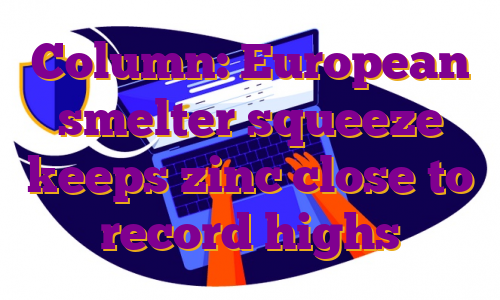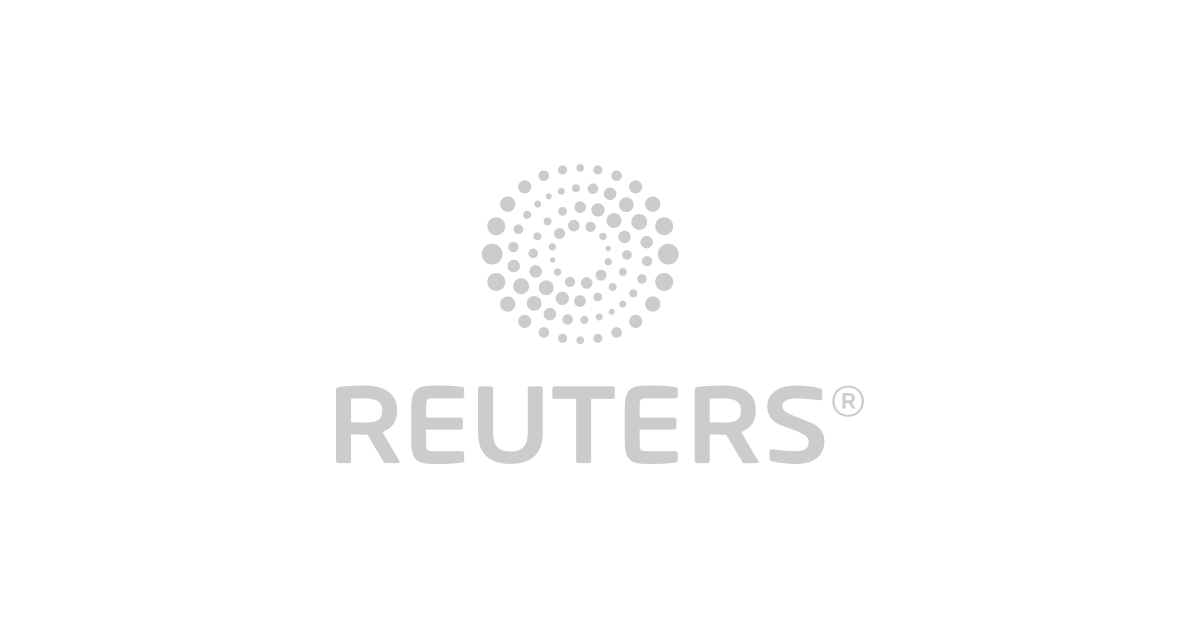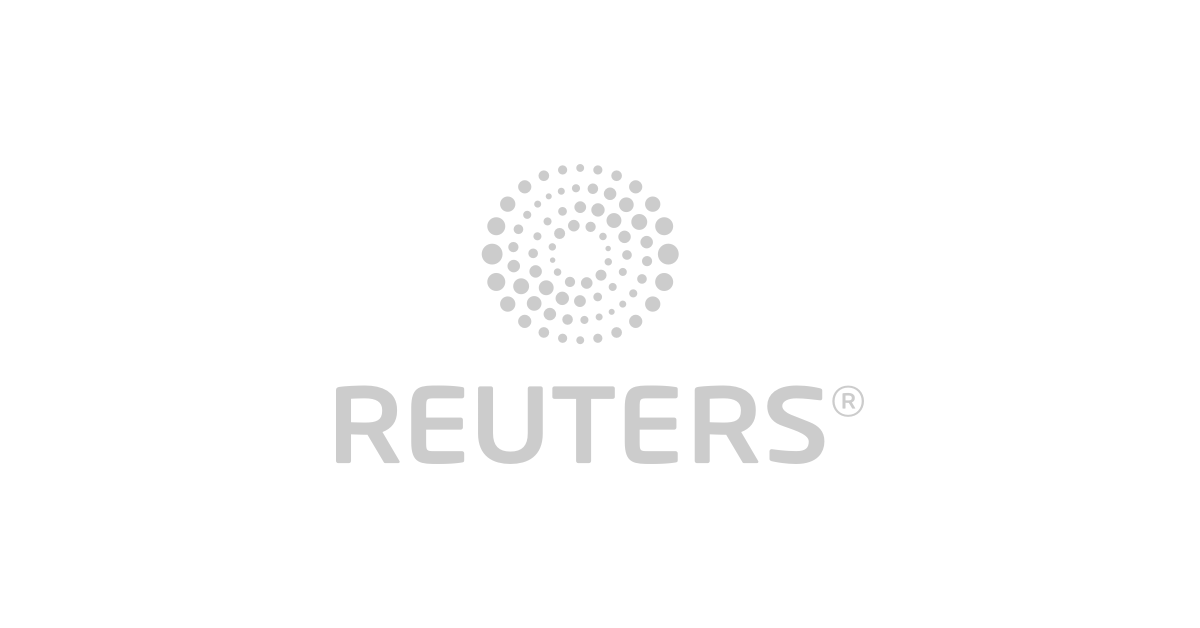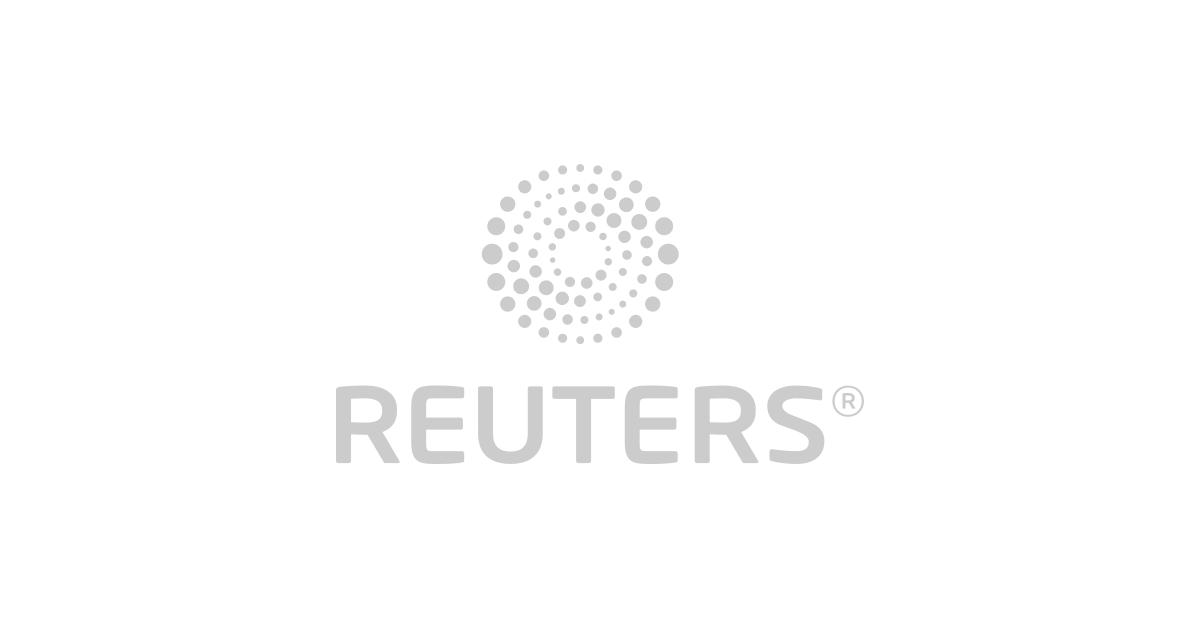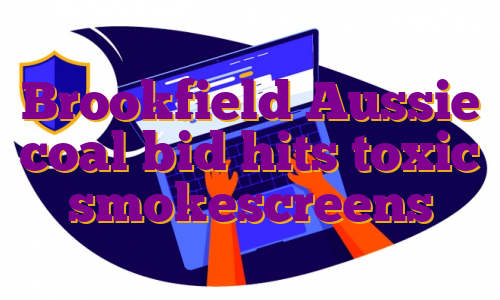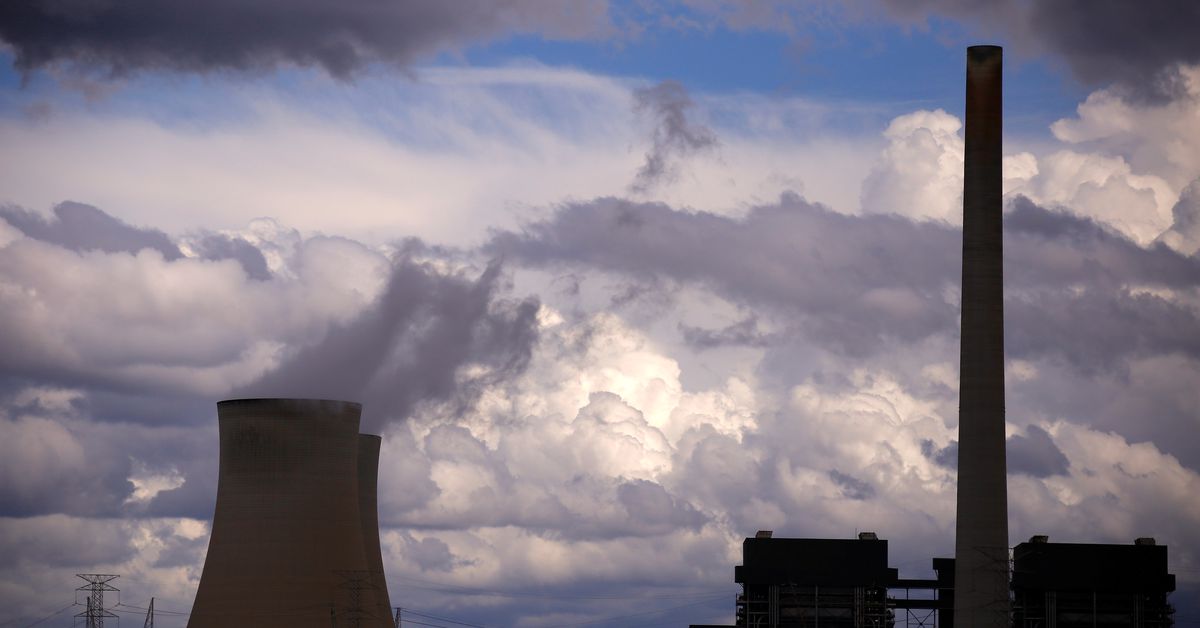LONDON, March 29 (Reuters) – London Metal Exchange (LME) zinc recorded a new all-time high of $4,896 per tonne earlier this month, eclipsing the previous 2006 peak of $4,580 per tonne.True, the March 8 spike was over in a matter of hours and looked very much like the forced close-out of positions to cover margin calls in the LME nickel contract, which was imploding at the time before being suspended.But zinc has since re-established itself above the $4,000 level, last trading at $4,100 per tonne, amid escalating supply chain tensions.Register now for FREE unlimited access to Reuters.comRussia’s invasion of Ukraine, which Moscow calls a special military operation, doesn’t have any direct impact on zinc supply as Russian exports are negligible.But the resulting increase in energy prices is piling more pressure on already struggling European smelters.European buyers are paying record physical premiums over and above record high LME prices, a tangible sign of scarcity which is now starting to spread to the North American market.The world is not yet running out of the galvanising metal but a market that even a few months ago was expected to be in comfortable supply surplus is turning out to be anything but.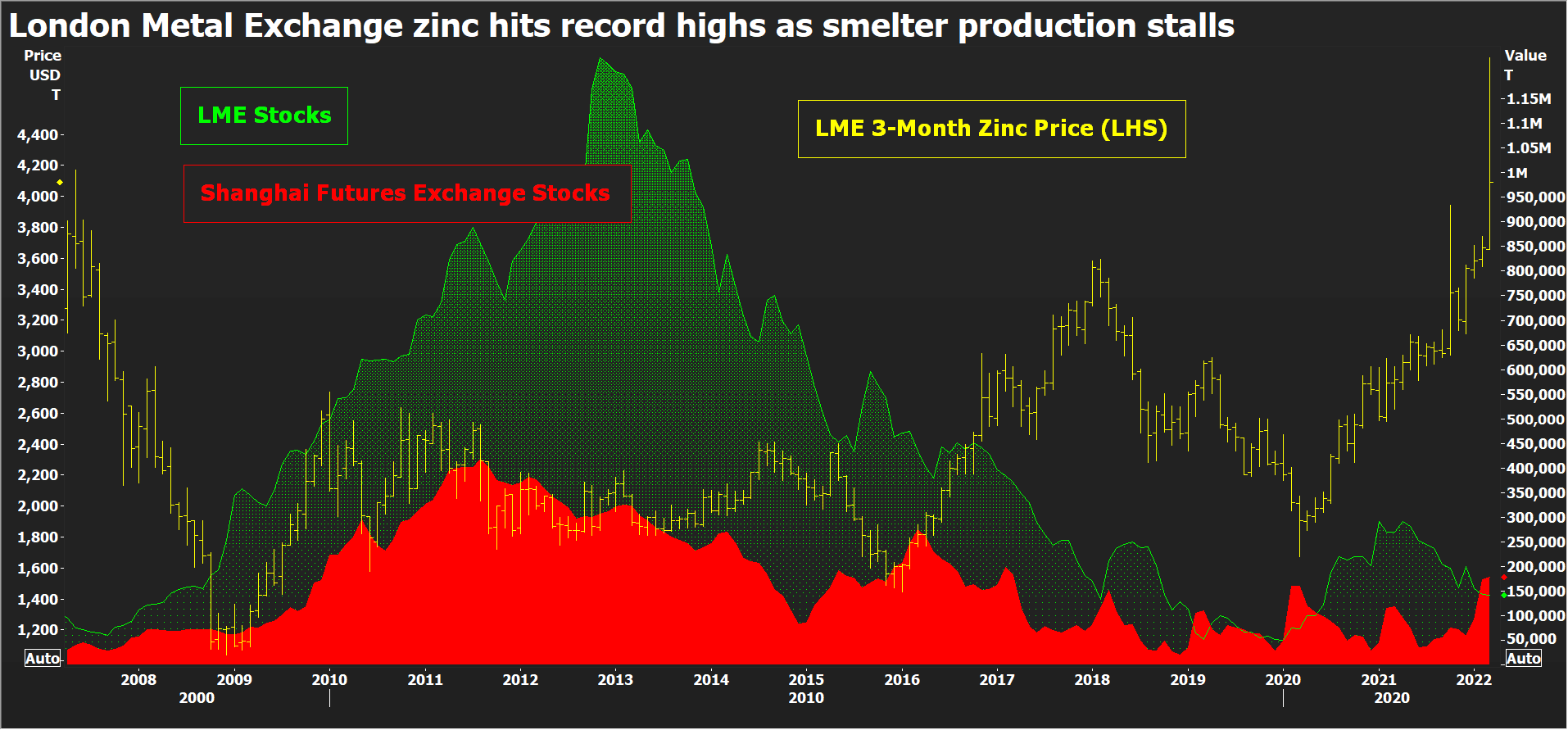 LME zinc price and stocks, Shanghai stocksEUROPEAN POWER-DOWNOne European smelter – Nyrstar’s Auby plant in France – has returned to partial production after being shuttered in January due to soaring power costs. But run-rates across the company’s three European smelters with combined annual capacity of 720,000 tonnes will continue to be flexed “with anticipated total production cuts of up to 50%”, Nyrstar said.High electricity prices across Europe mean “it is not economically feasible to operate any of our sites at full capacity”, it said.Still on full care and maintenance is Glencore’s (GLEN.L) 100,000-tonne-per-year Portovesme site in Italy, another power-crisis casualty.Zinc smelting is an energy-intensive business and these smelters were already in trouble before Russia’s invasion sent European electricity prices spiralling yet higher.Record-high physical premiums, paid on top of the LME cash price, attest to the regional shortage of metal. The premium for special-high-grade zinc at the Belgian port of Antwerp has risen to $450 per tonne from $170 last October before the winter heating crisis kicked in.The Italian premium has exploded from $215.00 to $462.50 per tonne over the same time frame, according to Fastmarkets.LME warehouses in Europe hold just 500 tonnes of zinc – all of it at the Spanish port of Bilbao and just about all of it bar 25 tonnes cancelled in preparation for physical load-out.Tightness in Europe is rippling over the Atlantic. Fastmarkets has just hiked its assessment of the U.S. Midwest physical premium by 24% to 26-30 cents per lb ($573-$661 per tonne).LME-registered stocks in the United States total a low 25,925 tonnes and available tonnage is lower still at 19,825 tonnes. This time last year New Orleans alone held almost 100,000 tonnes of zinc.
LME zinc price and stocks, Shanghai stocksEUROPEAN POWER-DOWNOne European smelter – Nyrstar’s Auby plant in France – has returned to partial production after being shuttered in January due to soaring power costs. But run-rates across the company’s three European smelters with combined annual capacity of 720,000 tonnes will continue to be flexed “with anticipated total production cuts of up to 50%”, Nyrstar said.High electricity prices across Europe mean “it is not economically feasible to operate any of our sites at full capacity”, it said.Still on full care and maintenance is Glencore’s (GLEN.L) 100,000-tonne-per-year Portovesme site in Italy, another power-crisis casualty.Zinc smelting is an energy-intensive business and these smelters were already in trouble before Russia’s invasion sent European electricity prices spiralling yet higher.Record-high physical premiums, paid on top of the LME cash price, attest to the regional shortage of metal. The premium for special-high-grade zinc at the Belgian port of Antwerp has risen to $450 per tonne from $170 last October before the winter heating crisis kicked in.The Italian premium has exploded from $215.00 to $462.50 per tonne over the same time frame, according to Fastmarkets.LME warehouses in Europe hold just 500 tonnes of zinc – all of it at the Spanish port of Bilbao and just about all of it bar 25 tonnes cancelled in preparation for physical load-out.Tightness in Europe is rippling over the Atlantic. Fastmarkets has just hiked its assessment of the U.S. Midwest physical premium by 24% to 26-30 cents per lb ($573-$661 per tonne).LME-registered stocks in the United States total a low 25,925 tonnes and available tonnage is lower still at 19,825 tonnes. This time last year New Orleans alone held almost 100,000 tonnes of zinc.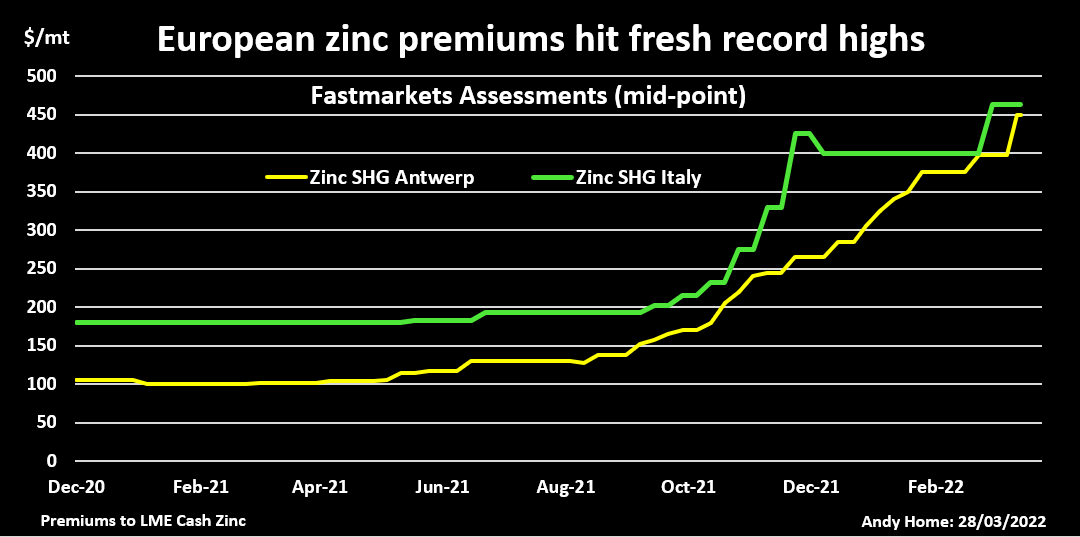 Fastmarkets Assessments of Antwerp and Italian physical zinc premiumsREBALANCING ACTAbout 80% of the LME’s registered zinc inventory is currently located at Asian locations, first and foremost Singapore, which holds 81,950 tonnes.There is also plenty of metal sitting in Shanghai Futures Exchange warehouses. Registered stocks have seen their usual seasonal Lunar New Year holiday surge, rising from 58,000 tonnes at the start of January to a current 177,826 tonnes.Quite evidently Asian buyers haven’t yet been affected by the unfolding supply crunch in Europe and there is plenty of potential for a wholesale redistribution of stocks from east to west.This is what happened last year in the lead market, China exporting its surplus to help plug gaps in the Western supply chain. Lead, however, should also serve as a warning that global rebalancing can be a slow, protracted affair due to continuing log-jams in the shipping sector.MOVING THE GLOBAL DIALWhile there is undoubted slack in the global zinc market, Europe is still big enough a refined metal producer to move the market dial.The continent accounts for around 16% of global refined output and the loss of production due to the regional energy crisis has upended the zinc market narrative.When the International Lead and Zinc Study Group (ILZSG) last met in October, it forecast a global supply surplus of 217,000 tonnes for 2021.That was already a sharp reduction from its earlier April assessment of a 353,000-tonne production overhang. The Group’s most recent calculation is that the expected surplus turned into a 194,000-tonne shortfall last year. The difference was almost wholly down to lower-than-forecast refined production growth, which came in at just 0.5% compared with an October forecast of 2.5%.With Chinese smelters recovering from their own power problems earlier in the year, the fourth-quarter deceleration was largely due to lower run-rates at Europe’s smelters.The ILZSG’s monthly statistical updates are inevitably a rear-view mirror but Europe’s production losses have continued unabated over the first quarter of 2022.Moreover, the scale of the shift higher in power pricing, not just spot but along the length of the forward curve, poses a longer-term question mark over the viability of European zinc production.A redistribution of global stocks westwards can provide some medium-term relief but zinc supply is facing a new structural challenge which is not going away any time soon.The opinions expressed here are those of the author, a columnist for Reuters.Register now for FREE unlimited access to Reuters.comEditing by David ClarkeOur Standards: The Thomson Reuters Trust Principles.Opinions expressed are those of the author. They do not reflect the views of Reuters News, which, under the Trust Principles, is committed to integrity, independence, and freedom from bias. .
Fastmarkets Assessments of Antwerp and Italian physical zinc premiumsREBALANCING ACTAbout 80% of the LME’s registered zinc inventory is currently located at Asian locations, first and foremost Singapore, which holds 81,950 tonnes.There is also plenty of metal sitting in Shanghai Futures Exchange warehouses. Registered stocks have seen their usual seasonal Lunar New Year holiday surge, rising from 58,000 tonnes at the start of January to a current 177,826 tonnes.Quite evidently Asian buyers haven’t yet been affected by the unfolding supply crunch in Europe and there is plenty of potential for a wholesale redistribution of stocks from east to west.This is what happened last year in the lead market, China exporting its surplus to help plug gaps in the Western supply chain. Lead, however, should also serve as a warning that global rebalancing can be a slow, protracted affair due to continuing log-jams in the shipping sector.MOVING THE GLOBAL DIALWhile there is undoubted slack in the global zinc market, Europe is still big enough a refined metal producer to move the market dial.The continent accounts for around 16% of global refined output and the loss of production due to the regional energy crisis has upended the zinc market narrative.When the International Lead and Zinc Study Group (ILZSG) last met in October, it forecast a global supply surplus of 217,000 tonnes for 2021.That was already a sharp reduction from its earlier April assessment of a 353,000-tonne production overhang. The Group’s most recent calculation is that the expected surplus turned into a 194,000-tonne shortfall last year. The difference was almost wholly down to lower-than-forecast refined production growth, which came in at just 0.5% compared with an October forecast of 2.5%.With Chinese smelters recovering from their own power problems earlier in the year, the fourth-quarter deceleration was largely due to lower run-rates at Europe’s smelters.The ILZSG’s monthly statistical updates are inevitably a rear-view mirror but Europe’s production losses have continued unabated over the first quarter of 2022.Moreover, the scale of the shift higher in power pricing, not just spot but along the length of the forward curve, poses a longer-term question mark over the viability of European zinc production.A redistribution of global stocks westwards can provide some medium-term relief but zinc supply is facing a new structural challenge which is not going away any time soon.The opinions expressed here are those of the author, a columnist for Reuters.Register now for FREE unlimited access to Reuters.comEditing by David ClarkeOur Standards: The Thomson Reuters Trust Principles.Opinions expressed are those of the author. They do not reflect the views of Reuters News, which, under the Trust Principles, is committed to integrity, independence, and freedom from bias. .
Australia’s Virtus accepts $514 million sweetened CapVest bid, topping BGH offer
March 14 (Reuters) – Australia’s Virtus Health Ltd said on Monday it had accepted a sweetened A$704.8 million ($514 million) takeover offer from CapVest Partners LLP, which topped an improved offer from rival bidder BGH Capital.However, the months-long bidding war for the in vitro fertilization service provider was not necessarily over as the deal with London-based CapVest allows the Virtus board to consider a superior proposal from Melbourne-based BGH or another party.CapVest’s revised cash offer of A$8.25 per share is a 7% premium to Virtus’s Thursday close and a 58% premium to its close on Dec. 13, before the bidding war broke out.Register now for FREE unlimited access to Reuters.comThe deal, unanimously recommended by the company’s board, knocks out a A$8.10 per share offer from Melbourne-based BGH Capital made after the market close on March 10. That offer was conditional on Virtus not signing an implementation deed with London-based CapVest.The latest CapVest deal includes a potential simultaneous off-market takeover offer, if it does not reach the required minimum threshold of 50% shareholder acceptance.Virtus’ share price has jumped around 64% since the end of 2019. read more ($1 = 1.3723 Australian dollars)Register now for FREE unlimited access to Reuters.comReporting by Savyata Mishra in Bengaluru; Editing by Richard Chang and Jane WardellOur Standards: The Thomson Reuters Trust Principles. .
Australia’s AGL Energy rebuffs sweetened $4 bln bid from Brookfield-led team
AGL Energy’s Liddell coal-fired power station is pictured in the Hunter Valley, north of Sydney, Australia, April 9, 2017. REUTERS/Jason ReedRegister now for FREE unlimited access to Reuters.com
- New offer pitched at 15% premium to pre-bid price
- AGL says demerger offers better value to shareholders
- AGL shares slip but hold above pre-bid price
MELBOURNE, March 7 (Reuters) – Australia’s AGL Energy confirmed on Monday it rejected a sweetened A$5.4 billion ($4.0 billion) takeover proposal from tech billionaire Mike Cannon-Brookes and Canada’s Brookfield Asset Management (BAMa.TO), saying it still undervalued Australia’s top power producer.Brookfield and Cannon-Brookes said they had walked away, leaving AGL to pursue plans to split its coal-fired power business from its energy retail business. AGL is Australia’s biggest carbon emitter and the consortium had planned to speed up the closure of its coal-fired power plants.”We are no longer engaged,” a Brookfield spokesperson said, declining to comment further.Register now for FREE unlimited access to Reuters.comThe revised proposal was pitched at A$8.25 a share, a 15% premium to AGL’s share price on Feb. 18, ahead of a first surprise approach from the Brookfield-led consortium at A$7.50 a share. The premium above AGL’s close last Friday.AGL’s shares fell 1.2% to A$7.34 on Monday but stayed above their pre-bid price.AGL is looking to split into two companies called Accel and AGL Australia following a 75% slump in the group’s value over the past five years, hammered by an influx of cheap solar and wind power and government pressure on utilities to slash power prices to households.Chief Executive Graeme Hunt said the demerged businesses would both have growth prospects in the shift to cleaner energy, with the biggest energy retail customer base in AGL Australia and valuable energy sites with 2.7 gigawatts of projects in the Accel business.”We see that the combined value of both entities is higher than the value of the company as it stands today, but none of that has been reflected in the offer that we received,” Hunt told Reuters.Cannon-Brookes said on Twitter the demerger path “was a terrible outcome for shareholders, taxpayers, customers, Australia and the planet we all share”.Fund managers who have shunned AGL’s shares over the past few years said it was hard to put a value on its demerger plan in a market that faces a range of challenges in the energy transition.Morgan Stanley raised its price target AGL to A$7.50 from A$6.88 on Friday and said there was potential for a 25% to 30% rise in a scenario in which all its coal-fired plants are closed by 2030 and it invests in 10 GW of renewables and back-up capacity.($1 = 1.3570 Australian dollars)Register now for FREE unlimited access to Reuters.comReporting by Sonali Paul in Melbourne and Savyata Mishra in Bengaluru; Editing by Chris ReeseOur Standards: The Thomson Reuters Trust Principles. .
Brookfield flips AGL out of furnace into coal fire
MELBOURNE, March 7 (Reuters Breakingviews) – The Canadian fund manager and its tech billionaire partner are abandoning a green takeover plan after their sweetened $6 bln bid was rejected. It leaves the Aussie power producer grappling with a weak demerger proposal and a pushy investor. Boss Graeme Hunt will feel the heat.Full view will be published shortly.Follow @AntonyMCurrie on TwitterRegister now for FREE unlimited access to Reuters.comCONTEXT NEWS- Brookfield Asset Management and Atlassian co-Chief Executive Mike Cannon-Brookes are walking away from an A$8.3 billion ($6.1 billion) takeover proposal for Australian power company AGL Energy, according to a March 6 tweet by Cannon-Brookes.- The consortium “looking to take private & transform AGL is putting our pens down – with great sadness,” he tweeted.- The decision follows AGL’s board rejection of a sweetened offer at A$8.25 a share, a 10% increase from the original offer.- The revised entreaty valued AGL’s equity at just under A$5.5 billion, a 15% premium to the price on Feb. 18, the day before the Brookfield group made its first offer, and a 31% premium to the three-month volume-weighted average price. Including debt, the offer valued the AGL enterprise at nearly A$8.3 billion.Register now for FREE unlimited access to Reuters.comEditing by Jeffrey Goldfarb and Thomas ShumOur Standards: The Thomson Reuters Trust Principles.Opinions expressed are those of the author. They do not reflect the views of Reuters News, which, under the Trust Principles, is committed to integrity, independence, and freedom from bias. .
Brookfield Aussie coal bid hits toxic smokescreens
Storm clouds can be seen behind chimneys at the Bayswater coal-powered thermal power station located near the central New South Wales town of Muswellbrook, Australia, March 14, 2017. Picture taken Mach 14, 2017. REUTERS/David Gray Register now for FREE unlimited access to Reuters.comRegisterMELBOURNE, Feb 23 (Reuters Breakingviews) – Brookfield Asset Management (BAMa.TO) and Grok Ventures’ A$5 billion ($3.6 billion) offer for AGL Energy read more has reignited Australia’s dirty climate wars. The asset manager and the investment fund of Atlassian (TEAM.O) co-founder Mike Cannon-Brookes want to plough up to A$20 billion into the coal-heavy power company to speed its shift to solar and wind. That ought to be a welcome development for a struggling target read more and for a federal government finally paying lip service read more to net-zero greenhouse-gas emissions. Instead, they’re returning to tired old anti-renewables tropes.The bidders face some deserved hurdles as it is. Success would mean Brookfield part-owning not just Australia’s largest power producer and retailer, but also, thanks to a recent A$10 billion club deal for AusNet, significant parts of the country’s transmission grid. That raises potential but probably not insurmountable competition concerns.To seal a deal, wannabe buyers also need to up their 4.8% premium. Some shareholders may agree that AGL’s plan to demerge its two divisions will destroy value, but Brookfield and Grok have to work off where the shares trade, not where they think they should. AGL Chief Executive Graeme Hunt is overplaying his hand implying he needs at least a 30% premium to start talks. But there’s probably some middle ground.Register now for FREE unlimited access to Reuters.comRegisterTrouble is, Hunt is raising the more serious spectre of Brookfield-Grok disrupting the energy market. That seems disingenuous while pitching for a higher offer, but he’s following the government’s lead: On the back of the bid, Prime Minister Scott Morrison warned early coal plant closures mean “electricity prices go up”. Treasurer Josh Frydenberg asserted it was an “indisputable fact” proved by the 2017 closure of Hazelwood power station.That specific comparison is wielded out of context: French owner Engie only gave six months’ notice before switching Hazelwood off, with no plans to replace production. And rising gas prices and big coal suppliers gaming the system also played a big role in price hikes, according to Australia’s own competition commission and researchers at the University of Melbourne.Brookfield and Grok are giving at least eight years’ notice and will only mothball coal once enough renewables are up and running. Of course, a parliamentary election due by May is fuelling tried and tested populist politics. The buyers could do without the toxic smokescreen.Follow @AntonyMCurrie on TwitterCONTEXT NEWS- AGL Energy Chief Executive Graeme Hunt on Feb. 22 said the A$5 billion ($3.6 billion) offer from Brookfield Asset Management and Grok Ventures offered very poor value for shareholders. He told The Australian newspaper that investors “typically, for a change of control…are looking for premium 30-40 plus per cent over whatever the appropriate share trading range is for the company”.- Hunt also called into question the consortium’s ability to replace AGL’s coal-fired power stations with adequate renewable energy sources by 2030. On the same day federal Treasurer Josh Frydenberg said it was an “indisputable fact” that energy prices will go up if coal-fired power stations close early, referring to the shutdown of the Hazelwood plant in Victoria in 2017.- Any takeover offer which leaves a foreign company owning 10% or more in an Australian company deemed part of critical infrastructure like energy, financial services, food and grocery, and water and sewage is subject to approval by the Foreign Investment Review Board, which submits its recommendations to the country’s Treasurer.- AGL’s bid represents a 4.8% premium to the stock’s closing price on Feb. 18. The prospective buyers made their approach on Feb. 19. The company’s board said on Feb. 21 that it had rejected the offer.Register now for FREE unlimited access to Reuters.comRegisterEditing by Jeffrey Goldfarb and Katrina HamlinOur Standards: The Thomson Reuters Trust Principles. .

